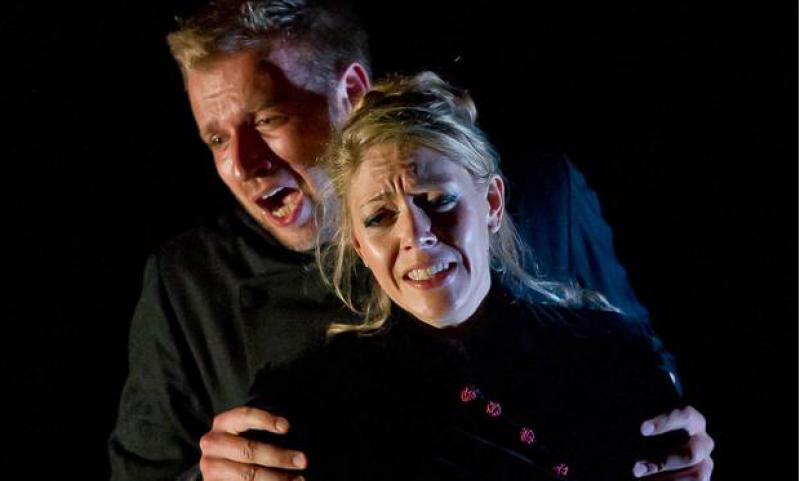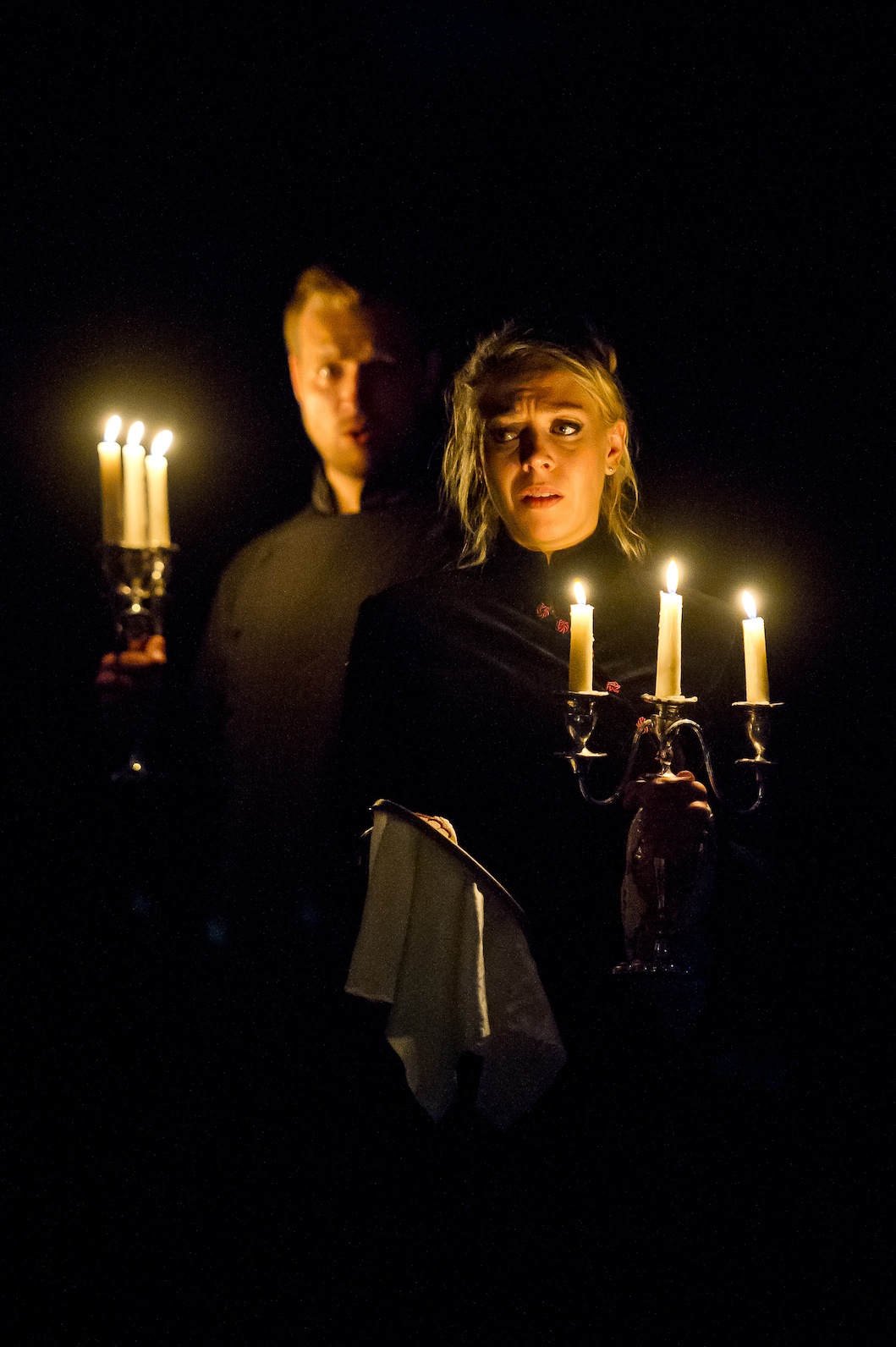The Killing Flower, Linbury Studio Theatre | reviews, news & interviews
The Killing Flower, Linbury Studio Theatre
The Killing Flower, Linbury Studio Theatre
An unusual chamber opera makes a masterly tribute to Carlo Gesualdo

In this classical anniversary year we’ve had masses of Wagner and Verdi, plenty of Britten (and still more Britten) but not much has been heard of 2013’s other birthday-boy, the notorious Carlo Gesualdo – prince, priest, composer and murderer. Best known for the extraordinary chromatic contortions of his madrigals and the stark, chiaroscuro beauty of his Tenebrae Responsories, the legend of his private life still dwarfs all.
An unaccompanied female voice pierces the blackness with white sound, tracing the arching contours of an elegy by 16th-century composer Claude Le Jeune. In the dark, melodies are long and connected in an unfolding sequence of continuity and development. But as soon as the elegy finishes and light is restored, musical certainties shatter. Phrases become abortive, fluttering affairs, as though a Monterverdi trill has become trapped, moth-like, in a jar, and now repeatedly beats and tremors.
It’s like musical Pinter - a drama of the unspoken and the unspeakable
Sciarrino’s sound-world is utterly unlike any other, as much characterised by what it doesn’t do as what it does. It doesn’t do development, as such, but a strange unity is conferred on the writing by repeating rhythmic patterns and phrase-shapes. Phrases are relative concepts here, constructed as much by the listeners, as we mentally fill in the sonic gaps and silences, as by the music itself. It’s like musical Pinter, a drama of the unspoken and the unspeakable.
In six short scenes the opera follows the relationship between the Duke and his Duchess from passionate love through infidelity (hers) and eventually to murder (also hers, and her lover’s). It’s a quick collapse that wastes no time on practicalities. Sciarrino’s scuttling musical motifs give us thoughts in their natural state – jerky, occasionally jarring and often half-formed – allowing him to cut straight to the emotional business. The result is instinctive and surprisingly flexible. A duet between the Duchess (Amanda Forbes, pictured below right with George Humphreys) and the Guest (William Towers) is quietly erotic, exploiting the timbral closeness of the soprano and countertenor voices and occasionally placing the male on top of the texture as the two writhe and coil musically among one another.
 The muscular purity of Towers’ voice works well here, swelling into enough richness to match the outstanding Forbes. Of all the singers it is she who finds the through-line in Sciarrino’s glittering fragments, stringing them together into something beautiful. George Humphreys’ Duke, though dramatically convincing, seemed less at ease in the composer’s musical idiom, never quite joining the dots into a coherent picture.
The muscular purity of Towers’ voice works well here, swelling into enough richness to match the outstanding Forbes. Of all the singers it is she who finds the through-line in Sciarrino’s glittering fragments, stringing them together into something beautiful. George Humphreys’ Duke, though dramatically convincing, seemed less at ease in the composer’s musical idiom, never quite joining the dots into a coherent picture.
Michael McCarthy’s understated, period production is very effective in a gutted Linbury Theatre that embraces singers, orchestra and audience all together in a single space. Ideally McCarthy would have dispensed with the weary theatrical go-tos of rose petals falling from the sky, billowing parachute silk, and black, white and red colour-scheme, but as with all clichés these visual tics are ubiquitous for a reason… McCarthy made them work as well as anyone ever has, and in the context of an otherwise sensitive production can be forgiven.
The Killing Flower is a memorable piece, and one that gets to the emotional point in a way few contemporary operas can. I spent little more than an hour in the company of Sciarrino’s troubled characters, and yet when I left they refused to leave me. Gothic, astringent and unexpectedly moving – as tributes to Gesualdo’s 400th birthday go, it’s fitting indeed.
rating
Explore topics
Share this article
The future of Arts Journalism
You can stop theartsdesk.com closing!
We urgently need financing to survive. Our fundraising drive has thus far raised £49,000 but we need to reach £100,000 or we will be forced to close. Please contribute here: https://gofund.me/c3f6033d
And if you can forward this information to anyone who might assist, we’d be grateful.

Subscribe to theartsdesk.com
Thank you for continuing to read our work on theartsdesk.com. For unlimited access to every article in its entirety, including our archive of more than 15,000 pieces, we're asking for £5 per month or £40 per year. We feel it's a very good deal, and hope you do too.
To take a subscription now simply click here.
And if you're looking for that extra gift for a friend or family member, why not treat them to a theartsdesk.com gift subscription?
more Opera
 Albert Herring, English National Opera review - a great comedy with depths fully realised
Britten’s delight was never made for the Coliseum, but it works on its first outing there
Albert Herring, English National Opera review - a great comedy with depths fully realised
Britten’s delight was never made for the Coliseum, but it works on its first outing there
 Carmen, English National Opera review - not quite dangerous
Hopes for Niamh O’Sullivan only partly fulfilled, though much good singing throughout
Carmen, English National Opera review - not quite dangerous
Hopes for Niamh O’Sullivan only partly fulfilled, though much good singing throughout
 Giustino, Linbury Theatre review - a stylish account of a slight opera
Gods, mortals and monsters do battle in Handel's charming drama
Giustino, Linbury Theatre review - a stylish account of a slight opera
Gods, mortals and monsters do battle in Handel's charming drama
 Susanna, Opera North review - hybrid staging of a Handel oratorio
Dance and signing complement outstanding singing in a story of virtue rewarded
Susanna, Opera North review - hybrid staging of a Handel oratorio
Dance and signing complement outstanding singing in a story of virtue rewarded
 Ariodante, Opéra Garnier, Paris review - a blast of Baroque beauty
A near-perfect night at the opera
Ariodante, Opéra Garnier, Paris review - a blast of Baroque beauty
A near-perfect night at the opera
 Cinderella/La Cenerentola, English National Opera review - the truth behind the tinsel
Appealing performances cut through hyperactive stagecraft
Cinderella/La Cenerentola, English National Opera review - the truth behind the tinsel
Appealing performances cut through hyperactive stagecraft
 Tosca, Royal Opera review - Ailyn Pérez steps in as the most vivid of divas
Jakub Hrůša’s multicoloured Puccini last night found a soprano to match
Tosca, Royal Opera review - Ailyn Pérez steps in as the most vivid of divas
Jakub Hrůša’s multicoloured Puccini last night found a soprano to match
 Tosca, Welsh National Opera review - a great company reduced to brilliance
The old warhorse made special by the basics
Tosca, Welsh National Opera review - a great company reduced to brilliance
The old warhorse made special by the basics
 BBC Proms: The Marriage of Figaro, Glyndebourne Festival review - merriment and menace
Strong Proms transfer for a robust and affecting show
BBC Proms: The Marriage of Figaro, Glyndebourne Festival review - merriment and menace
Strong Proms transfer for a robust and affecting show
 BBC Proms: Suor Angelica, LSO, Pappano review - earthly passion, heavenly grief
A Sister to remember blesses Puccini's convent tragedy
BBC Proms: Suor Angelica, LSO, Pappano review - earthly passion, heavenly grief
A Sister to remember blesses Puccini's convent tragedy
 Orpheus and Eurydice, Opera Queensland/SCO, Edinburgh International Festival 2025 review - dazzling, but distracting
Eye-popping acrobatics don’t always assist in Gluck’s quest for operatic truth
Orpheus and Eurydice, Opera Queensland/SCO, Edinburgh International Festival 2025 review - dazzling, but distracting
Eye-popping acrobatics don’t always assist in Gluck’s quest for operatic truth
 MARS, Irish National Opera review - silly space oddity with fun stretches
Cast, orchestra and production give Jennifer Walshe’s bold collage their all
MARS, Irish National Opera review - silly space oddity with fun stretches
Cast, orchestra and production give Jennifer Walshe’s bold collage their all

Add comment